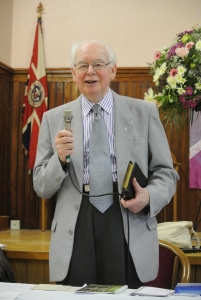
John Mitchell 1929-2015
The regular reader of this blog will be alert to the fact that the last two editions have pondered over two of three aspects of Christian conversion. It follows this must be the third and final presentation of our chosen topic – a matter of relevance and significance in the undergirding of our evangelism. There are three conversions to a Christian man or woman’s life. First, to Christ, then to the Church and then back to the world. Or, put another way, there are three ways in which an alleged conversion may be incomplete and imperfect. This exercise introduces itself thus: a conversion is incomplete if it does not leave us with a sense of overwhelming responsibility for the world. The sisters and brothers we are bidden to strengthen and support are both outwith the church and within. A temptation for the church is for us to become a holy huddle, cosying up to one another for warmth. Yes! I know! I know! I have pleaded in the second post on this theme for us to create the warmth of a loving, caring fellowship. At the same time, a church must never become a closed shop, drawing its blinds to the world outside; lost in praise and prayer; connoisseurs of preaching and liturgy; busy congratulating itself on the excellence of its Christian experience and Christian fellowship. Although in recent years the church has accepted its responsibility to serve the present age, sadly in my view there are still some Christian folk who see the church’s sole role as securing the soul a space in heaven.
The name Bob Holman may be a familiar one to some if your newspaper is the Herald or the Guardian. There was a time when he regularly wrote for both those newspapers. Although not all of his readers always agreed with him, his columns were popular as they were stimulating and challenging. I may be wrong but I would credit him as an ardent, evangelical Christian by conviction, with a strong measure of socialism surging through his veins. What is more, he practised what he preached. He was a professor at Bath University, from which post he resigned to launch a community project among vulnerable residents in a deprived area of Bath. After ten years there, he and his wife moved to Easterhouse, a suburb of Glasgow with a reputation of deprivation and its accompanying social problems, and there he became associated in the social and community ministry of the pastor of the Baptist Church he attended. He not only worked in this greatly disadvantaged and much publicised community, he lived there, side by side with his neighbours, identifying with them, helping in their personal and family crises, supporting and encouraging them when they were in conflict with the authorities. And in between, he wrote to newspaper editors and politicians on matters of political concern or social injustice, championing the cause of the poor and inadequate.
I have on my shelves a book by Bob Holman entitled Ordinary Christians. He writes: For nearly fifty years, everywhere that I go God gives me friends, ordinary people with whom I feel comfortable, whom I care for and who care for me. The book tells the stories of twelve ordinary people who became Christians and shows that God still calls such people to serve Him. Like Bron, a converted agnostic, who, in spite of personal difficulties and disappointments, raised funds, supported and visited as a volunteer a ministry in El Salvador. Even in her fifties and in retirement she lived frugally and bought all her clothes from charity shops. She said: As a socialist I gave 10% of my salary, as an Anglican I gave 30%, when I became a Catholic I thought it should be all for the Lord. The stories of the others are similar, converts to Christianity, joining the church, sustained by the fellowship and following in the footsteps of the Lord, loving, caring and working for those who are among the world’s born-losers.’ Converted to new life; converted to serve; back to the world. A worthy response to the Good News of Jesus.

65 years a preacher
John Mitchell
3rd July 1929 – 31st May 2015
Rest in peace

![Conversion of St Augustine. Fra Angelico (circa 1395–1455) and workshop [Public domain], via Wikimedia Commons](https://mitchellcalled.files.wordpress.com/2015/05/800px-fra_angelico_-_conversion_de_saint_augustin.jpg?w=625&h=391)
![The Baptism of the Ethiopian Eunuch by the Deacon Philip. Lambert Sustris [Public domain], via Wikimedia Commons](https://mitchellcalled.files.wordpress.com/2015/04/lambert_sustris_-_the_baptism_of_the_ethiopian_eunuch_by_the_deacon_philip_-_wga21979.jpg?w=625&h=327)
